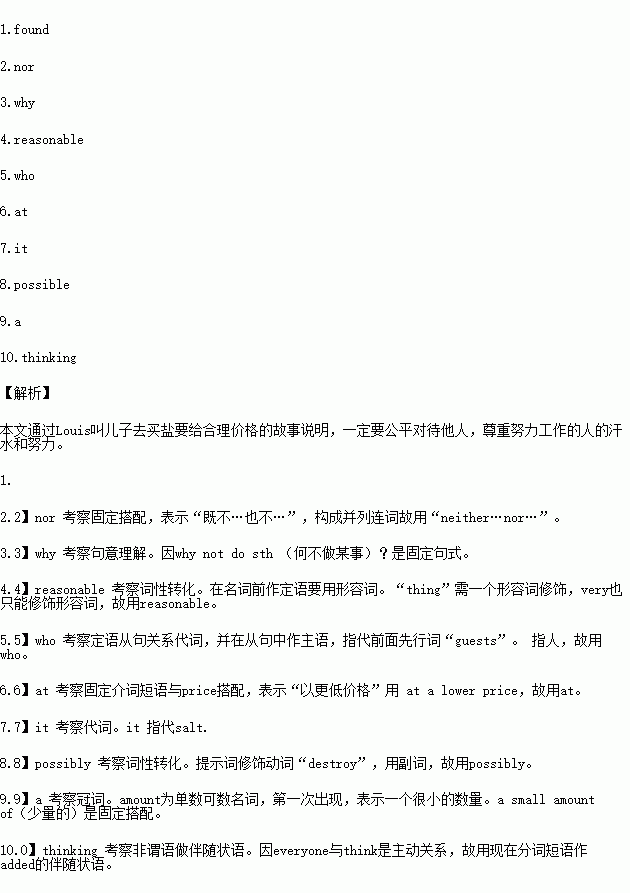题目内容
阅读下面材料,在空白处填入适当的内容(不多于3个词)或括号内单词的正确形式,并把答案写在答题卡上的相应位置。
Louis invited his friends to lunch one day. He was cooking some delicious food in the kitchen. Suddenly, he 1. (find) that he had run out of salt. So Louis called to his son, “Go to the village and buy some salt, but pay a fair price for it: neither too much 2. too little.”
His son looked surprised. “I can understand why I shouldn’t pay too much, Father, but if I can pay less, 3. not save a bit of money?”
“That would be a very 4. (reason) thing to do in a big city, but it could destroy a small village like ours,” Louis said.
Louis’s guests, 5. had heard their conversation, asked why they should not buy sale more cheaply if they could. Louis replied, “The only reason why a man would sell sale 6. a lower price would be that he was desperate for money. And anyone who took advantage of that situation would be showing a lack of respect for the sweat and struggle of the man who worked very hard to produce 7. .”
“But such a small thing couldn’t 8. (possible) destroy a village.”
“In the beginning, there was only 9. very small amount of unfairness in the world, but everyone added a little, always 10. (think) that it was only small and not very important, and look where we have ended up today.”
Su Hua is studying at Cambridge, UK. She has bought a bicycle and is worried about security (安全). Her friend, Kate, found this article and sent it to her.
Introduction A lot of crime is against bicycles. About 150,000 bicycles are stolen every year and most are never found. You can prevent this happening by following a few careful steps. Basic Security Do not leave your bicycle in out-of-the-way places. Always lock (锁上)your bicycle when you leave. Secure it to lampposts or trees. Take off smaller parts and take them with you, for example lights and saddles (车座). Locks Get a good lock. There are many different types in the shops. Buy one that has been tested against attack. Ask for a recommendation from a bike shop. Marking Security marking your bike can act as a deterrent to a thief. It can also help the police find your bicycle. It should be clearly written and include your postcode and your house or flat number. This will provide a simple way to identify your bicycle. Registration There are a number of companies who will security mark your bicycle for you. They will then put your registration number and personal details on their computer database. Then if your bicycle is found it will be easy to contact you. Finally keep a record of the bicycle yourself: its make, model and registration number. You can even take a photograph of it. This will prove the bicycle belongs to you. |
1.Which part of the text gives you information on how to lock up your bicycle when you leave it?
A. Marking. B. Locks.
C. Basic Security. D. Registration.
2.The underlined phrase “act as a deterrent to a thief” means ______.
A. help the police find your bicycle
B. help you recognize your bike
C. stop you worrying about your bike
D. stop someone stealing your bicycle
3.The article advises you to keep a record of your bicycle _______.
A. in the police station and a security company
B. in the bike shop and your computer
C. by yourself and in a security company
D. in a security company and your university
4.The main purpose of this article is _________.
A. to suggest ways of keeping your bicycle safe
B. to tell you what to do if your bicycle is stolen
C. to say why you shouldn’t keep your bicycle in a quiet place
D. to give you advice on where to buy a good lock

